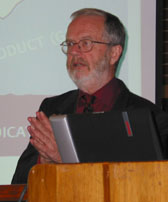
by Kelly Hill
The new consumers are coming, and they have a dramatic environmental impact.
Norman Myers, who has been called the Paul Revere of the environmental movement, brought that message to a crowd at the Alumni House as the guest lecturer at Tuesday afternoon’s William Main Distinguished Visitor lecture by the College of Natural Resources’ Center for Forestry. Due to the rapid development of countries such as China, Mexico, South Africa, India and Brazil, the wall-to-wall poverty of decades past is giving rise to a new global middle class.
Myers, who grew up in northern England and earned his undergraduate and masters degrees at Oxford, received his Ph.D. from Berkeley’s College of Natural Resources in 1973. He has worked in countries around the world and received many awards for his work in the environmental arena. He is at Berkeley to receive the Haas International Award, to be presented at the campus Commencement Convocation ceremony on May 13.
While Myers noted that the swift rise from poverty has vastly improved the lives of millions, he also sounded cautionary notes on what could happen if all global consumers follow the same path as wealthy nations such as the U.S.. And, he said, wealthy countries themselves need to take a hard look at their resource consumption.
“We in the rich world can’t start being critical of folks on the horizon unless we are setting a massive, undeniable example ourselves,” Myers said.
Myers said that the long-standing ultra-rich number about 850 million in a world of 6.1 billion. The new consumers could reach 1.1 billion people in 17 developing countries, with 300 million in China alone.
But the environmental impact of providing houses, food and electricity-powered appliances, televisions and computers to those new consumers could, as Myers put it, have the world bumping against the ceiling of its natural resources
Air pollution is already a serious problem in many developing countries, Myers noted. Automobiles are also the fastest growing source of carbon dioxide emissions that contribute to greenhouse gasses.
The impacts are economic, as well. When countries divert a large portion of their grain to livestock feed, which provides beef for middle-class diets, they become dependent on imports — and food which could go to poor people goes to feed cattle that feed their rich countrymen.
If China were to divert one fifth of the grain it is feeding to cattle, Myers said, to the country could provide food for the 125 million malnourished Chinese citizens.
So, Myers asked — how do we get from a consumption-crazy outlook to a more sustainable world? He had these suggestions:
* Use an alternative economic indicator other than gross national product or GNP, which counts activities such as the Exxon Valdez oil clean-up as positive economic activity rather than a negative cost to society.
* Take into account the environmental harm that gasoline creates, and charge for it accordingly. Myers said this would result in gas prices of about $6 to $7 a gallon.
* Phase out what Myers called “perverse subsidies” for fossil fuels, agriculture and road transportation that allow unsustainable practices to continue.
* Perform simple, individual acts such as eating less meat, installing fluorescent light bulbs and using public transportation —these save people money and save resources and energy.
Myers pointed to the fall of Communism and apartheid and the vast numbers of people who have given up smoking as evidence that people, and governments, can successfully take on the challenge of change. But, he said, a major shift in attitude needs to be part of the economic shift to more efficient, sustainable economics.
“In some sense, it’ll cost us more in our heads than in our pocketbooks,” Myers said.
